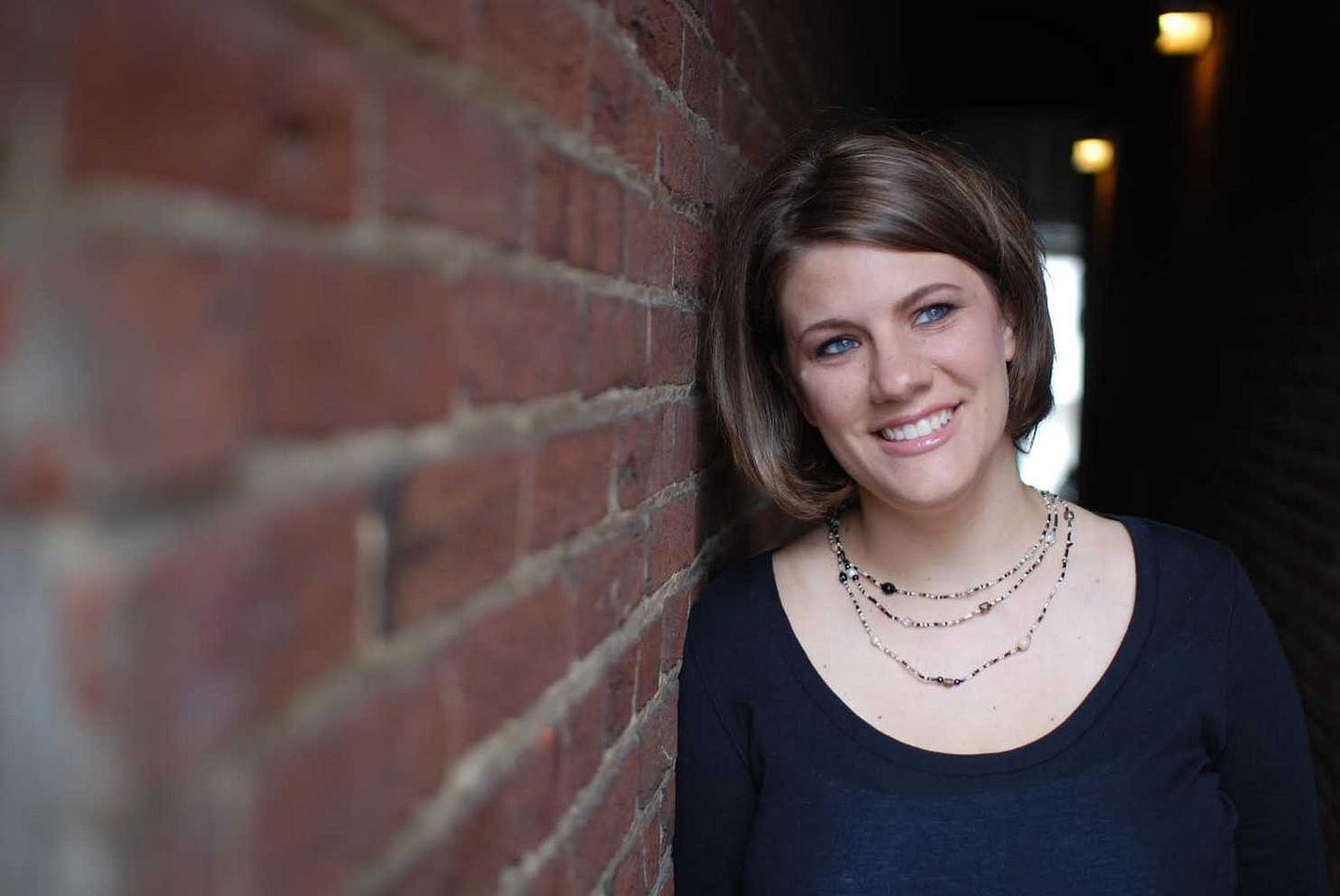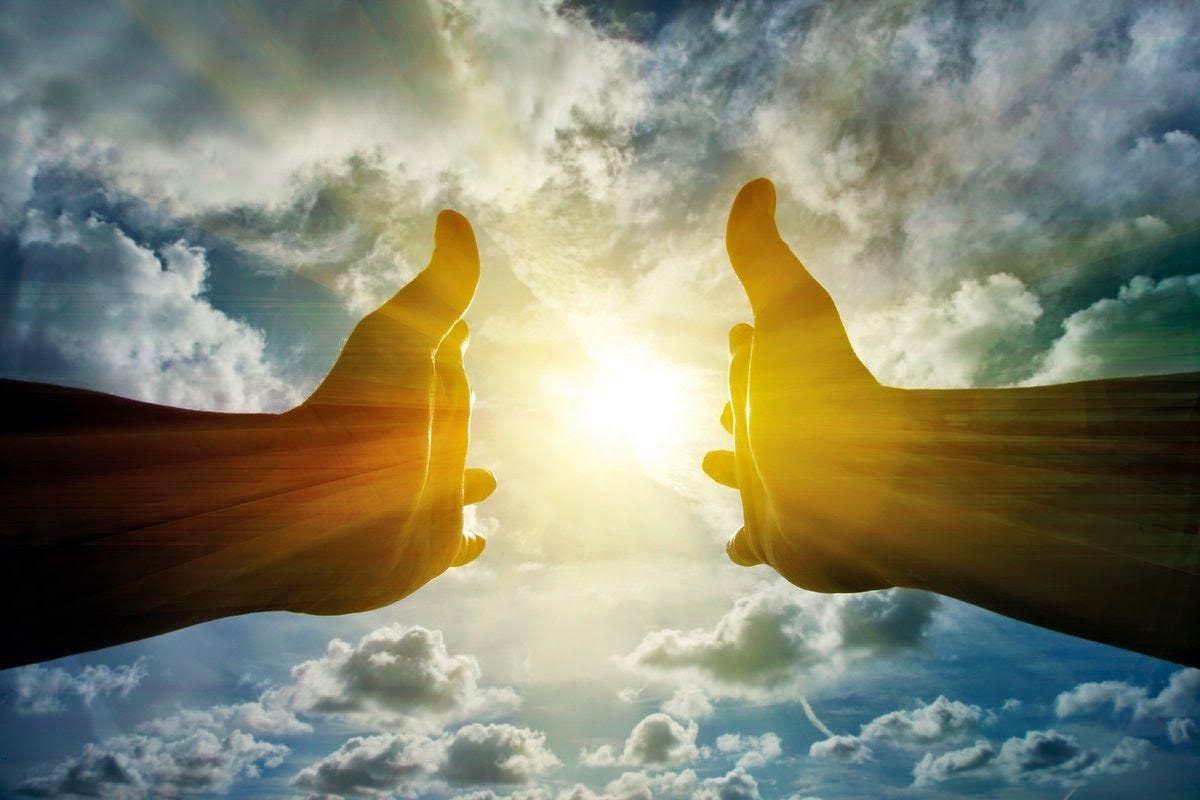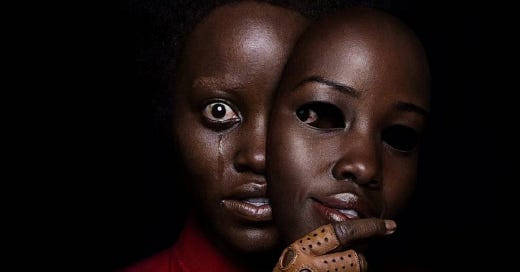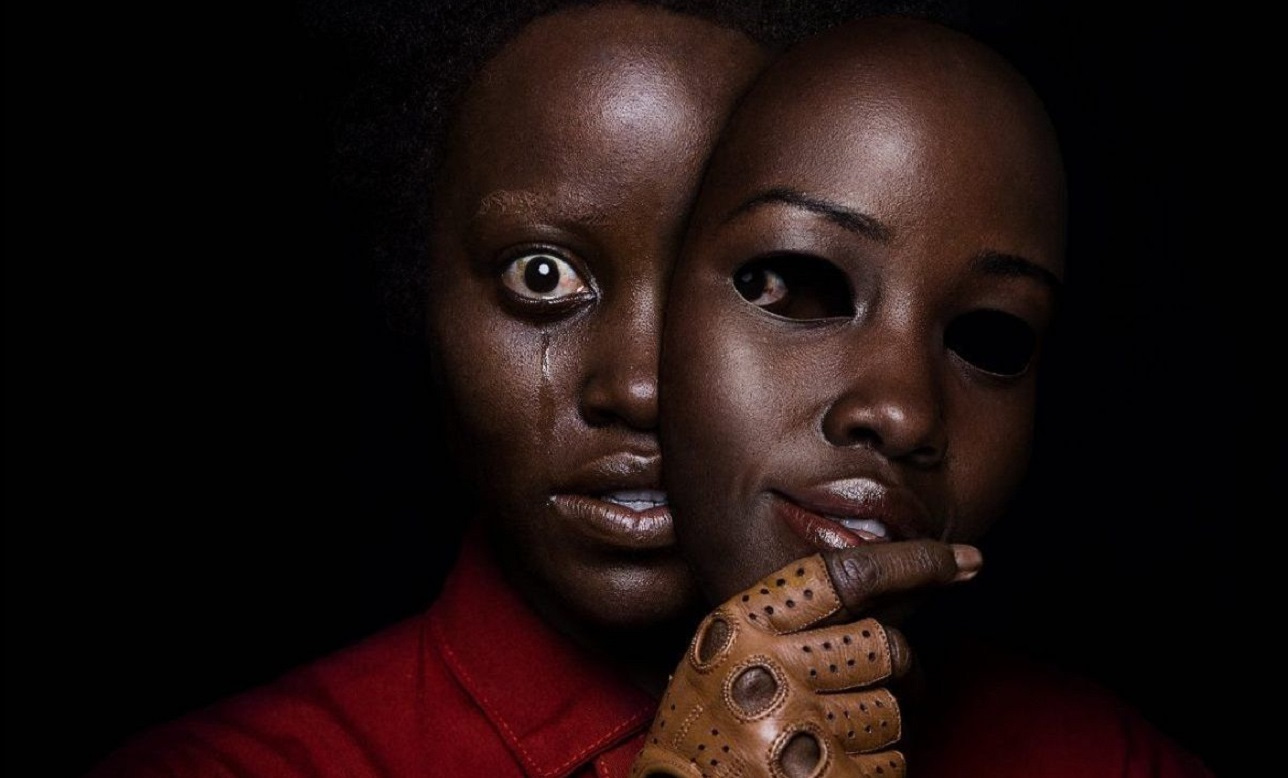WHO WOULD I BE IF I COULD LET THIS GO
"I don't like horror movies" is something I said for years. I don't know exactly when I decided I wasn't a horror film person...
But it might have been around the time I saw "The Watcher In The Woods" starring Bette Davis. I was maybe nine years old. It chilled me to the bone. I guess I figured what was the point of putting my nervous system through that kind of duress when there were so many other non-terrifying forms of entertainment available to me. So when my college friend Elliott asked me to see the Jordan Peele film "Us" my immediate response was a firm 'No.' Elliott twisted my arm a bit and I ended up relenting, but not without some real anxiety. Jordan is a producer on my new series, "The Hunt," and I figured I would see it owing to some professional duty, even if that professional duty looked like me hunched low in my seat with my hands covering my eyes for ninety minutes.
But the strangest thing happened. I loved the movie. It was so much fun watching a smart, scary thriller sandwiched in with a sold-out crowd at BAM on a Friday night. It reacquainted me with the basic pleasures of the shared communal experience, which seem to be ever rarer in our increasingly atomized world. And I was struck by how un-scared I was, which is not to say the movie wasn't scary. It was! But this is something that came as a shock to me: I'm not ten years old anymore. I've stared down a lot of demons since Bette Davis terrified me at ten. And I realized that I could let go of "I don't like horror films." Because it seems that sometimes... I do.
It got me thinking about other things I say reflexively, 'truths' I carry about myself that have been reinforced through repetition. And I wonder if maybe some of these 'truths' aren't so true anymore.
I was allergic to eggs until I was about five and after that I no longer tested positive for the allergy. But for some reason the imprinting stuck and for much of my life I not only didn't eat eggs, I had a hard time watching other people eat them. But then about a decade ago I was having lunch with a girlfriend. I'd finished my lunch and was still hungry while my girlfriend had a half-eaten omelette on her plate. I took a small bite. Then another. And then (with her permission) I gobbled up the rest. From that day forward I've been a gleeful omelette eater.
Another 'truth' about myself: "I'm allergic to dogs and cats." This one is a touch more complicated because I will often start sneezing in a house with a dog or cat before I even know there's an animal in the house. But I've also noted that I don't think I'm quite as allergic as I used to be. And that maybe I can loosen the death grip I've had my whole life upon the phrase "I'm allergic to dogs and cats."

All of which is to say that I'm trying to be a touch more cautious about how I describe myself. Because it seems - if I'm not careful - I can freeze myself in certain ways with these statements. And then I'm forced to play out some storyline that was perhaps true twenty years ago but might not be true for me today. And then I'm stuck. (Wilco frontman Jeff Tweedy is clearly engaged in this process in his own way as shown in this delightful animated short: Learning to Love the Music You Hate.)
This has bigger implications, of course, than horror films, music, eggs, dogs, or cats. It speaks to a larger process of examining thoughts and beliefs, of hitting 'update' on our hard drive. We're all the authors of our own lives - or at the very least co-creators - and every halfway decent writer knows the absolute necessity of revision. Our first drafts are invariably our weakest. So I'm trying to catch myself when one of these 'truths' pops up and ask myself the following questions:
"Is this true for me anymore?"
"Do I still believe this?"
"Who would I be if I could let this go?"
****
A fiercely good and brave writer named Rachel Held Evans died on May 4. She was 37 years old. I did not know Rachel but I've done a deep dive into her work in the last month and I'm left with the feeling that I lost a friend I hadn't met yet. Rachel's whole adult life, it seemed, was dedicated to this necessary process of reflection and revision, of holding her beliefs - especially the ones she inherited from her church - up to the light, holding onto those that resonated with her heart and tossing those that, as Walt Whitman said, insulted her soul.
This process couldn't have been easy. Rachel was raised in the evangelical church and was a good and faithful Christian soldier in her early life (She writes rather hilariously about her streak of winning the "Best Christian Attitude" award many years running in her elementary school days.) But in college, doubts began to grip her and refused to let go. Rather than submerging or compartmentalizing them, she began giving voice to them, initially on-line, where she became a joyful provocateur to the powers-that-be and dear friend to those similarly doubting, hurting, and lost.
(For a brief overview of Rachel's life and legacy I recommend this episode of The Daily as well as Jonathan Merritt's very moving tribute: Remembering a 'torchbearer,' an 'arsonist,' and a 'prophet with a pen.')
Her first book "Faith Unraveled: How a Girl Who Knew All the Answers Learned to Ask Questions" is a total page-turning pleasure that I can't recommend highly enough. I tore through it in a few days. It was bracing to witness a person engaged in such a sincere wrestling match with contradiction, inconsistency, doubt, and faith, all while maintaining a deep hunger for God, spirit, and truth (all synonyms, imho.) She kept knocking on the door and demanding answers. She refused to toe the party line if it tossed aside mercy, grace, compassion, and forgiveness. She was absolutely allergic to hypocrisy.
On Jen Hatmaker's podcast she talked about drawing inspiration from the Jewish approach to scripture, where the words of the holy texts are never the end of the conversation but rather the beginning. She really seemed to take this to heart. I've come across no truer statement than hers in regards to the maddening contradictions one encounters when reading the Bible:
“If you are looking for verses with which to support slavery, you will find them. If you are looking for verses with which to abolish slavery, you will find them. If you are looking for verses with which to oppress women, you will find them. If you are looking for verses with which to liberate or honor women, you will find them. If you are looking for reasons to wage war, you will find them. If you are looking for reasons to promote peace, you will find them. If you are looking for an out-dated, irrelevant ancient text, you will find it. If you are looking for truth, believe me, you will find it. This is why there are times when the most instructive question to bring to the text is not "what does it say?", but "what am I looking for?" I suspect Jesus knew this when he said, "ask and it will be given to you, seek and you will find, knock and the door will be opened." If you want to do violence in this world, you will always find the weapons. If you want to heal, you will always find the balm.”

It's a curious thing - at least to me - why I, who was raised Jewish in the midwest, would respond so deeply to the writing of a woman raised in the Bible Belt wrestling with the evangelical church. But I felt so connected to her struggle. I'm convinced we all have wounds around God and religion, even if we weren't raised with much of either. Our culture is saturated in guilt-ridden, punitive angry-God language. I suspect we could all use some measure of healing around this, no matter our background or current belief or disbelief in God. Who among doesn't long to be less self-punishing and shame-filled? To have more access to the golden virtues of grace, mercy, forgiveness, and compassion?
I respond to anyone engaged in the struggle to rewrite these lousy messages that continue to ping around in our heads, that continually mistake our own impatience, anger, judgment, and condemnation for God's. Rachel didn't try to 'worship' Jesus, she tried to be like Jesus. It's useful to always remember that Jesus was a law-breaker, a fierce critic of the gatekeepers whose allegiance to the 'law' was often a smokescreen for cruelty. Rachel saw who was being marginalized, persecuted, made to feel less-than, and it's those people to whom she chose to extend her hand and break bread. (One of her more famous quotes is: "I thought God wanted to use me to show gay people how to be straight. Instead God used gay people to show me how to be Christian." Another favorite of mine: "What a comfort to know that God is a poet.")
The #BecauseofRHE hashtag trended for days after her death, people from all over the world testifying as to how her writing and bravery helped heal so many of their wounds around God and religion. It was a tremendously moving read. Buried amidst the many beautiful tributes I discovered this gorgeous poem:
Blessing for the Brokenhearted
by Jan Richardson
Let us agree
for now
that we will not say
the breaking
makes us stronger
or that it is better
to have this pain
than to have done
without this love.
Let us promise
we will not
tell ourselves
time will heal
the wound,
when every day
our waking
opens it anew.
Perhaps for now
it can be enough
to simply marvel
at the mystery
of how a heart
so broken
can go on beating,
as if it were made
for precisely this—
as if it knows
the only cure for love
is more of it,
as if it sees
the heart’s sole remedy
for breaking
is to love still,
as if it trusts
that its own
persistent pulse
is the rhythm
of a blessing
we cannot
begin to fathom
but will save us
nonetheless.

I did a deep dive with Ken Jordan on The Evolver Podcast about ayahuasca, which is something dear to my heart but also not something I've talked much about publicly. I appreciated Ken's openness and the feeling of safety I felt during our whole conversation.
I'm playing a couple of my original songs (Radnor sans Lee) at Rockwood Music Hall in NYC Saturday July 13 at 8:30. I'll do 45 minutes and then Ada Pasternak will do 45 minutes (which adds up to **does quick calculation** 90 minutes!) Excited/nervous! Come by if you're in town. Tix here.
****
Some essential reading from Nicholas Kristof: When We Kill: Everything you think you know about the death penalty is wrong.
Abolishing all prisons sounded insane to me before I read this article. Curious if others will feel similarly altered: Is Prison Necessary? Ruth Wilson Gilmore Might Change Your Mind.
A friend turned me on to this heartbreaking gem from The Moth: I fell in love with a man a decade younger than me.
This couple may have had one of longest marriages of any pair with Down syndrome. And possibly one of the happiest.
Did you guys see Brene Brown's Netflix special? It's a must-watch. Here's a great piece from Vanity Fair on her: Brene Brown Wants To Change Your Life. And I really loved her reflections on the gifts of sobriety: What Being Sober Has Meant To Me. Oh, and her WTF with Marc Maron is also terrific.
You will need a box of tissues handy (yes, a box) for this story. This one really gutted me. It's a devastating story, perfectly told: Faith, Friendship, and Tragedy at Santa Fe High: A Muslim exchange student from Pakistan with dreams of changing the world, struck up an unlikely friendship with an evangelical Christian girl. The two became inseparable -- until the day a fellow student opened fire.
I loved this: How To Draw A Horse.
Jia Tolentino's piece on the connection between drugs and religion is first-rate: Losing Religion and Finding Ecstasy in Houston: Christianity formed my deepest instincts and I have been walking away from it for half my life.
And finally -- because my god we need to laugh -- here's twenty minutes of comedy heaven: Every single Key & Peele Valet sketch.
****
As always, if you're enjoying these please spread the word (people can sign up here) And if you're new to these check out past Museletters. JR




